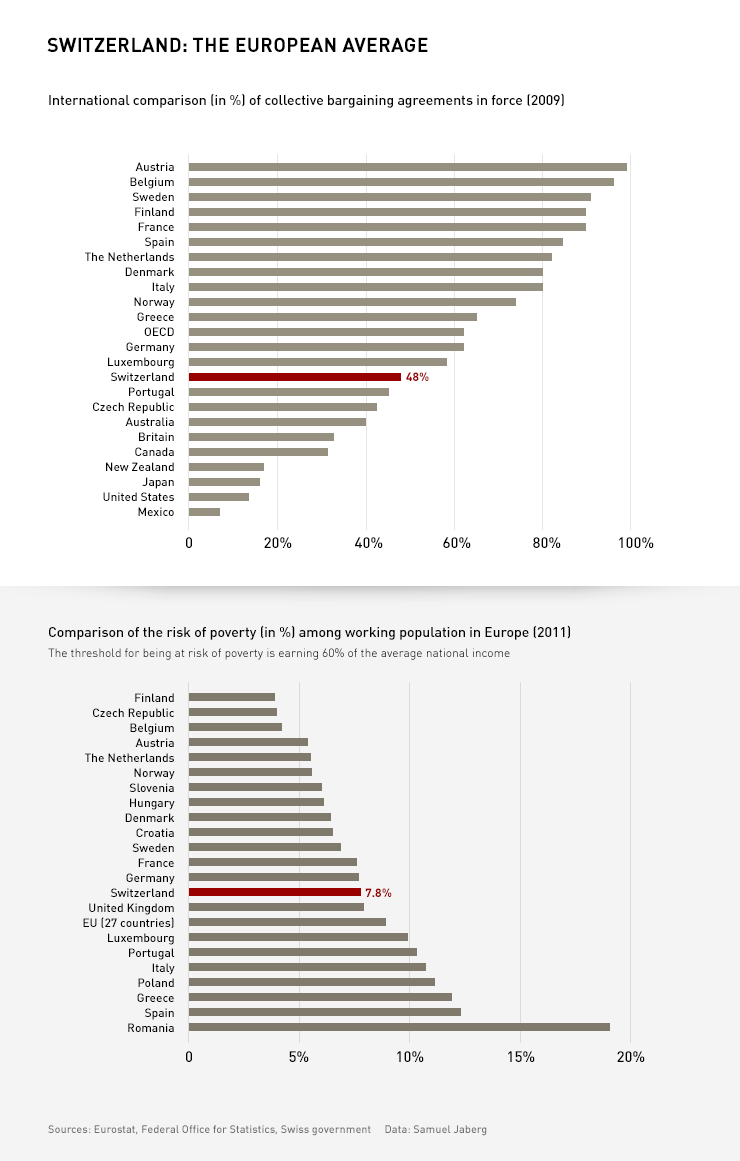Weighing up the consequences of a minimum wage

The idea of introducing a minimum wage in Switzerland is making headway, although the issue remains controversial and international studies haven’t shed much light on it. Yves Flückiger, who directs the University of Geneva’s Employment Observatory, explains why.
Parliament will take up the issue in the near future and the Swiss are expected to vote on it next year at the earliest. But the people’s initiative on minimum wages, “For the Protection of Fair Salaries,” is already spurring much debate.
The initiative calls for the introduction of a minimum legal wage of CHF22 ($23) per hour, equivalent to a full-time monthly salary of about CHF4,000. The amount should be “adjusted regularly with the evolution of wages and prices so that it cannot be less than the evolution of the pension index for the elderly and survivors”.
The introduction of a minimum wage was recently approved by the citizens of cantons Jura and Neuchâtel (see infobox), and the issue is pending in several other cantons.

More
Minimum wages – a European snapshot
swissinfo.ch: What factors propelled the call for a legal minimum wage in Switzerland ?
Yves Flückiger : I see two main factors: on the one hand, the suspicion of “wage dumping” tied to bilateral accords between Switzerland and the European Union and, on the other hand, the high salaries paid to certain business executives.
Although the free movement of people has not led to wage dumping in my opinion, the question always comes up in the political arena. And with regard to the debate over “excessive salaries” for top executives, that conversation automatically leads to discussions about the lowest salaries.
The “decency” of salaries has been at the heart of several recent political debates in Switzerland. The controversy, originating from top executives’ ballooning earnings, launched two people’s initiatives aimed at curbing executive compensation.
The first, the so-called “fat cat initiative”, was launched by Schaffhausen entrepreneur Thomas Minder and passed with 68 per cent of the vote in a nationwide ballot last month. The second, named 1:12 – for fair salaries, was introduced by the Young Socialists and will likely be put to a nationwide vote by the end of this year.
In addition, the debate over low salaries led to the launch of a third initiative – for the protection of fair salaries – introduced at the nationwide level by the Trade Union Federation.
Other initiatives proposing a minimum wage have been launched at the cantonal level. All were introduced in French-speaking Switzerland, more affected by the economic crisis and unemployment than the German-speaking region. Four cantonal initiatives have so far been brought to a public vote; they were rejected in cantons Vaud and Geneva and accepted in Neuchâtel and Jura.
Between now and the end of the year, canton Valais will vote on an initiative to introduce a minimum wage of CHF3,500 per month, while in canton Ticino, the Green Party has introduced an initiative based on canton Jura’s model.
swissinfo.ch: On an international level, there are plenty of studies about the impact of introducing a minimum wage, but the conclusions differ. How does one verify their accuracy?
Y.F.: It’s not a question of contradicting conclusions but of studies conducted in varying national contexts with extremely varied job markets and minimum wages. Also, in some cases, the minimum salary concerns the working population aged ove 20, and in others, it is for the entire population.
Until the end of the 1980s, studies done by the Organisation for Economic Co-operation and Development (OECD) generally concluded that minimum wages had a negative impact. Later, research conducted in the US showed there could be a positive impact, under certain conditions, on the creation of employment.
Today, the OECD recognises that a minimum wage can also provide a way back into the workforce: it guarantees that work is a more attractive option than social aid or unemployment benefits, especially for single-parent families.
Increasing the minimum wage from $7.25 to $9 per hour is one of the main items on US President Barack Obama’s second-term agenda. The higher minimum wage would amount to about 40 per cent of the US median income.
If the same measure were to be applied in Switzerland, it would amount to a monthly salary of about CHF2,400 per month. But it is impossible to compare these two countries because their situations are very different, says Yves Flückiger.
In addition, in the US, the minimum wage is used as a macro-economic political instrument: it seeks to give the most disadvantaged sector of the population more purchasing power so that the salary increase helps to spur domestic economic consumption, explains Flückiger.
swissinfo.ch: Could certain studies conducted in other countries be used to predict the impact of a minimum wage in Switzerland?
Y.F.: It is extremely difficult to make such international comparisons because it has to do with a very complex question that’s impossible to give a simple answer to. As I already mentioned, every situation is different and so is the impact. It would be possible to measure the impact in terms of the number of people affected and the cost for companies. But it is much more difficult to assess the impact this could have on employment.
What we can say is that in international comparisons, the proposed minimum wage in Switzerland is at a higher level. At CHF4,000 per month, it represents two-thirds of the average Swiss monthly salary of CHF6,000.
One must also address the enormous disparities that exist inside the country. For example, the average salary in canton Ticino is CHF5,400 but is CHF6,500 in Zurich. To fix a minimum wage at CHF4,000 for all of Switzerland could have a much bigger impact on Ticino than on Zurich.
The same is true for the various economic sectors. In a branch where the median salary is CHF4,000 or less, the new minimum wage would signify a salary increase for most of the employees. As a result, the impact would be great in those sectors and could provoke a problem in terms of employment. That’s the case, for example, in the services industry, a sector with a median income of CHF3,700, or in the hotel and restaurant industry, where the average salary is just CHF4,100.

More
Salaries in Switzerland
swissinfo.ch: Would canton Jura’s model of sector-dependent minimum wages be appropriate for Switzerland ?
Yes. One of the major challenges of a national approach is introducing the same level of minimum wage in regions with very different cost of living realities. The initiative approved in canton Jura will be adapted to the sectoral and regional diversity as well as to the organisation of the labour market and collective bargaining agreements (CBAs).
We can’t forget that minimum wages exist in Switzerland, but these are determined as part of the CBAs and vary from one economic sector and one region to another. It would be better to introduce minimum wages in all of the CBAs and to expand their scope. Some progress has already been made through the measures accompanying the free movement of people, but we must go even further in that direction.
swissinfo.ch: Would introducing a minimum wage weaken social partnerships and the CBAs?
I don’t think so. The CBAs regulate many things, not just salary issues – some people don’t even consider them in this category at all. I think if Switzerland has weathered difficult economic situations, it’s largely due to the organisation of the labour market based on decentralised negotiations between social partners. This allows us to find appropriate solutions to each case. Social dialogue remains very important.
(Translated by Veronica DeVore)

In compliance with the JTI standards
More: SWI swissinfo.ch certified by the Journalism Trust Initiative











You can find an overview of ongoing debates with our journalists here . Please join us!
If you want to start a conversation about a topic raised in this article or want to report factual errors, email us at english@swissinfo.ch.